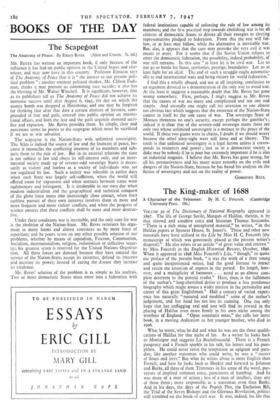BOOKS OF THE DAY
The Scapegoat
The Anatomy of Peace. By Emery Reyes. (Allen and Unwin. 7s. 6d.)
MR. REVES has written an important book, if only because of the influence it has had on public opinion in the United States and else- where, and may now have in this country. Professor Einstein says of The Anatomy of Peace that it is "the answer to our present poli- tical problem " ; another eminent political thinker, Mr. Clifton Fadi- man, thinks it may prevent us committing race suicide; it also has the blessing of Mr. Walter Winchell. It is significant, however, that as its publishers tell us The Anatomy of Peace did not achieve its immense success until after August 6, 1945, the day on which the atomic bomb was dropped at Hiroshima; and one may be forgiven for thinking that after that date a certain element of hysteria, com- pounded of fear and guilt, entered into public opinion on interna- tional affairs, and both the fear and the guilt urgently demand sacri- fice and expiation. Mr. Reyes provides them. In simple, clear and passionate terms he points to the scapegoat which must be sacrificed if we are to win salvation.
The scapegoat is the Nation-State with unlimited sovereignty. The State is indeed the source of law and the fountain of peace, be- cause it reconciles the conflicting interests of its members and sub- jects them to the rule of law. But in its external relations the state is not subject to law and obeys its self-interest only, and an inter- national society made up of seventy-odd sovereign States is neces- sarily as violent and lawless as a society of individuals who are not regulated by law. Such a society was tolerable in earlier days when each State was largely self-sufficient, when the world still offered room for expansion and when contacts between states were rudimentary and infrequent. It is intolerable in our own day when modern industrialism and the geographical and technical conquest of the globe force states into increasingly close contact, when their ruthless pursuit of their own interests involves them in more and more frequent and more violent conflicts, and when the progress of science ensures that these conflicts shall be more and more destruc- tive.
Under these conditions war is inevitable, and the only cure for war is the abolition of the Nation-State. Mr. Reyes reiterates his argu- ment in many forms and almost convinces us by mere force of repetition; and he pours scorn on any other possible solution of our problems, whether by means of capitalism, Fascism, Communism, Socialism, internationalism, religion, isolationism or collective secur- ity; his greatest scorn is reserved for the United Nations Organisa- tion. All these forces are damned because they have entered the service of the Nation-State, accept its existence, defend its interests and increase its power; instead of curing the disease they increase its virulence.
Mr. Reyes' solution of the problem is as simple as his analysis. Two or more democratic States must enter into a federation with
federal institutions capable of enforcing the rule of law among its members; and the first practical step towards abolishing war is for all citizens of democratic States to devote all their energies to electing representatives pledged to federation. From this the rest will fol- low, or at least may follow, while the alternative is inevitable war. But, alas, it appears that the cure may provoke the very evil it was meant to avert. For it seems that if the Soviet Union refuses to enter the democratic federation, the possibility, indeed probability, of war still remains. In this case "at least let it be civil war. Let us not go to battle for bases, territories, prestige, boundaries. Let us at least fight for an ideal. The end of such a struggle ought automatic- ally to end international wars and bring victory for world federation."
I find this a wholly absurd, and not at all inspiring, conclusion to an argument devoted to a demonstration of the only way to avoid war. At the least it suggests a reasonable doubt that Mr. Reyes has gone wrong somewhere. First, perhaps, I might suggest to Mr. Reyes that the causes of war are many and complicated and not one and simple. And secondly one might call his attention to one almost too obvious fact which *suggests that the existence of the Nation-State cannot in itself be the sole cause of war. The sovereign State of Monaco threatens no one's security, except perhaps the gambler's ; indeed it is clear that of the seventy-odd sovereign states there are only two whose unlimited sovereignty is a menace to the peace of the world. If these two giants were in chains, I doubt if we should worry because the other sixty-eight were still loose and at liberty. The truth is that unlimited sovereignty is a legal fiction unless it corres- ponds to resources and power ; just as in a democratic society a duke may be nobody if he is poor but extremely important if he is also an industrial magnate. I believe that Mr. Reyes has gone wrong, for all his persuasiveness and his many acute remarks on the evils and dangers of the Nation-State, because he has based his analysis on the fiction of sovereignty and not on the reality of power.
GORONWY REES.


































 Previous page
Previous page